The War of the Roses ranks as one of the most violent periods of English history, during which conspiracies, massacres, and public executions were part of everyday life. For someone to stand out in such a time as being especially heinous is remarkable, but one man has that distinction. He was John Tiptoft, 1st Earl of Worcester (1427-1470), who was notorious for impaling enemies of Edward IV, a punishment unknown in England at the time. His cruelty to his enemies was so appalling that, even during a time of fierce civil war, it drew censure even from his own allies.
And yet, despite this cruel streak, Tiptoft was a quite remarkable man. He came from an esteemed noble family, enjoyed a glittering political career, and was one of the greatest humanist scholars of his day. He travelled Europe in search of learning, translated Cicero, and was a man of great Catholic faith. Although it is hard to forget Tiptoft enthusiastically signing execution warrants and impaling Lancastrian enemies, this is only part of the story. History tells us that nothing is created in a vacuum, and so we must ask how Tiptoft, the embodiment of cruelty and learning, came to be.

John Tiptoft was born on 8th May 1427, the son of John Tiptoft, First Baron Tiptoft (d.1443), a prominent nobleman. The first John Tiptoft was Knight of the Shire for Huntingdonshire and Somerset, Speaker of the House of Commons, Treasurer of the Household, Chief Butler of England, Treasurer of the Exchequer and Seneschal of Landes and Aquitaine. The younger Tiptoft thus grew up in a wealthy household directly involved in the political machinations of the fifteenth-century, a period in which doubts were raised over the suitability, and even legitimacy, of the House of Lancaster to rule.

The House of Lancaster had seized power in 1399, when the unpopular and ineffective King Richard II was toppled by his cousin Henry Bolingbroke, later Henry IV. Bolingbroke spent much of his early reign putting down rebellions after starving Richard to death in Pontefract Castle. His son, Henry V, was an immensely popular figure whose success in France (most notably at the Battle of Agincourt in 1415) united the country, but his untimely death led to his infant son Henry VI taking the throne. Henry VI was a weak king, and so the Lancastrian line was again disputed.
The first John Tiptoft worked closely with all three of these Lancastrian kings, as a diplomat for Henry V and counsellor to the beleaguered Henry VI, and died shortly before the War of the Roses began. In this clandestine and unsettled period the younger John grew up, and as the only son of such an eminent man was expected to follow in his footsteps. He inherited his father’s title when he died in 1443, and was made an Earl merely six years later. By this time, he had begun the education on which his many enemies blamed his bloodthirsty nature.

